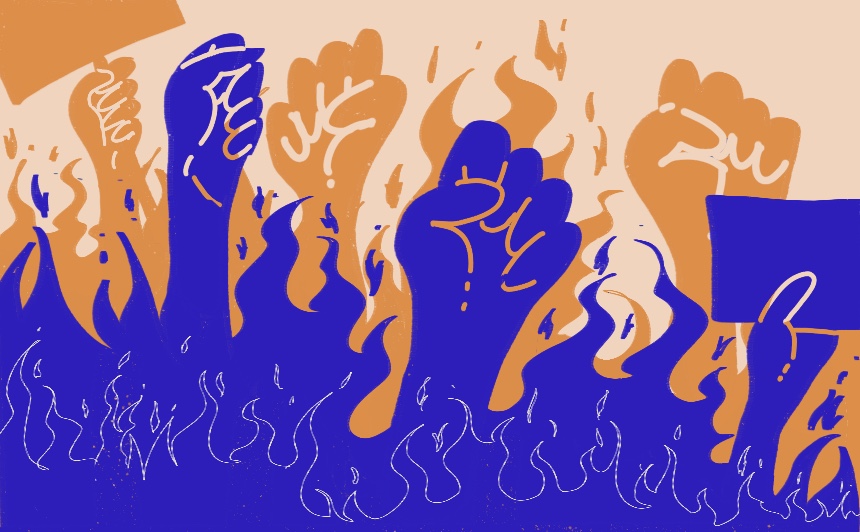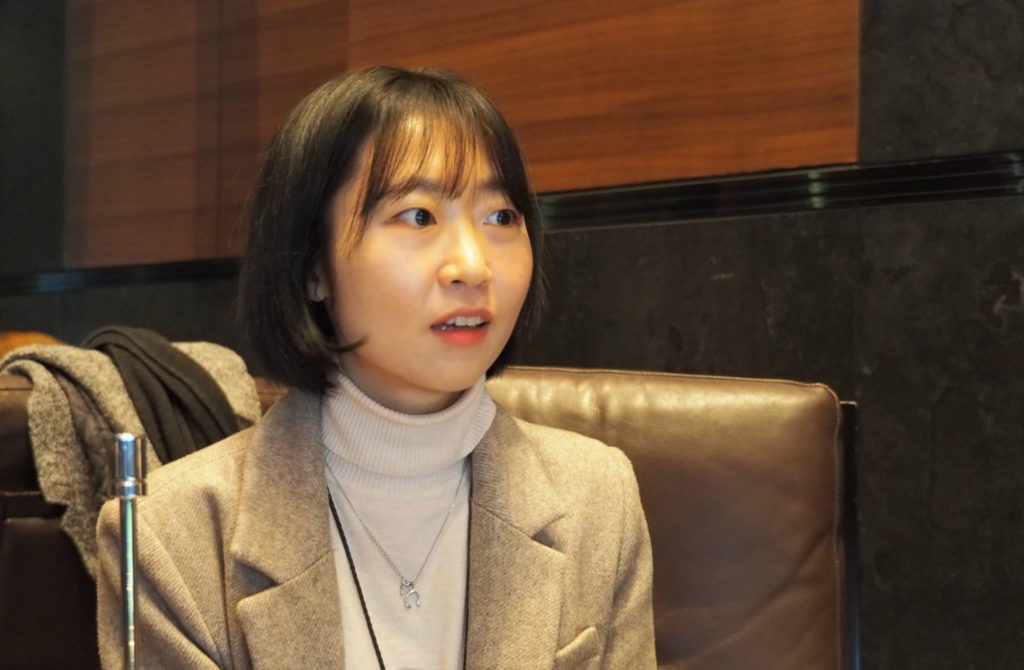How public anger changed South Korean society (part 1): Over 2 million endorsed petition to disclose perpetrators’ identity (8)
2023.03.29 14:42 Mariko Tsuji
Public anger against digital sex crimes in South Korea was sparked by journalists’ and activists’ work, and resulted in arrests and revised laws.

(Illustration by qnel)
As reported in the previous article, I learned through my interview with Kou Shikata, a professor at Chuo University and former member of the National Police Agency, that Japan’s current laws are insufficient to regulate “Video Share,” “Album Collection,” or the platforms that provide them, Google and Apple. This is because the apps and websites don’t have a clear mechanism to attract illegal sexually explicit images. Shikata also said there is no precedent for Japanese authorities charging a platform operator like Google or Apple.
But as long as there are ways of spreading sexually explicit images, posting such images for the purpose of making money will continue. Is there any way to regulate it?
I decided to report on a similar case in South Korea, where online sexual violence has become a major social issue due to the “Nth Room” scandal in 2020. South Korean police arrested thousands of perpetrators in connection with the case, and revisions have been made to multiple South Korean laws.
Police moved to gather information from across Korea
I visited Seoul, South Korea, from Feb. 6–10, 2023.
The Nth Room case involved a group of perpetrators, mostly in their teens and 20s, who threatened and sexually assaulted their victims and sold their photos and videos via the Telegram messaging app. Around 260,000 people viewed and traded the images, with one man making 300 million yen (roughly $2.2 million) from the scheme.
The case was first reported in September 2019 by a two aspiring journalists in university who called themselves “Team Flame.” In November, the Hankyoreh became the first major media outlet to report on the issue.
I was able to interview reporter Oh Yeon-seo, who had been part of the Hankyoreh’s reporting team, at a hotel near the National Assembly. Oh, who is currently in the paper’s political section, sat down and said apologetically, “Please give me some time to write an urgent article.” Despite her busy schedule, she made time for the interview.
The Hankyoreh reported on the “Doctor’s Room,” where, among the various chat rooms, particularly vicious abuse was taking place. The man who ran the Doctor’s Room, Cho Ju-bin, was arrested and sentenced to 42 years in prison for multiple crimes.
“When we received the information [about the case] and formed the reporting team, rather than simply report on what was happening, I wanted the police to start an investigation as soon as possible,” Oh said.
The reporters gathered evidence of the damage and asked the Seoul Metropolitan Police Agency to quickly conduct an investigation. However, they were only told that the police were investigating — not how far the investigation had progressed. The Hankyoreh reporters, thinking they must stop the damage as soon as possible, monitored the “Doctor’s Room” and provided detailed information about their findings to the police.
The reporters also thought of another way to spur on the police. Kim Wan, Oh’s senior at the Hankyoreh, provided information to the Korean National Police Agency through the Prime Minister’s office. The Korean National Police Agency found that damage related to the “Doctor’s Room” had been reported to multiple local police stations. It decided to gather information in Seoul to confirm that these were related incidents.
At the time, no major media outlet other than the Hankyoreh was reporting on the damage caused by the Telegram chat rooms.
“It didn’t become a social issue when only one media reported it,” Oh said.
After about a month, Hankyoreh’s articles gradually started to be shared and discussed on Twitter and other social media platforms, but they still didn’t drive any social change. What did, Oh recalled, were the “national petitions.”
The national petitions that lit a fire
From 2017 to 2022, the Moon Jae-in administration introduced a system of national petitions. Citizens could register petitions via the Blue House’s (the presidential office) website, and the government responded to petitions endorsed by more than 200,000 people over 30 days. Petition contents were public, and citizens could endorse them using social media accounts such as KakaoTalk.
In January 2020, the first petition related to the Nth Room case was created by a women’s citizen group called “ReSET,” which was formed in December 2019 in response to the case. ReSET monitors chat rooms and websites such as Telegram and reports information it gathers to the police and app administrators, as well as makes recommendations for police and judicial system reform.
ReSET filed a petition to the National Assembly seeking a fundamental solution to repeated digital sex crimes. The petition was endorsed by 100,000 people in a month — and it, at last, sparked widespread public outrage. As the true scope of the Nth Room case became clear, various national petitions were launched, such as those requesting the disclosure of the list of chat room members and the changing the judge in charge of the case. Nine petitions garnered more than 200,000 endorsements.
When Cho Ju-bin, who ran the Doctor’s Room, was arrested in March 2020, there was a petition demanding the disclosure of his identity and for him to be interviewed by the press; in just four days, more than 2 million people had endorsed it — the highest ever number of supporters for a national petition.
In response to the citizens’ demands, President Moon Jae-in said on March 23 that the Nth Room case consisted of “brutal acts that destroy the life of a person.” He declared there would be a thorough investigation and a revision of the law.

Hankyoreh reporter Oh Yeon-seo in an interview with Tansa. (Photo by Mariko Tsuji on Feb.8, 2023)
Activists joined forces
I had the opportunity to meet and speak with two of the ReSET members who helped shape Korean public opinion on digital sex crimes.
All members of ReSET are women. They use nicknames in their work for ReSET and don’t even know each other’s real names. They told me that, when responding to interview requests, they prefer to be interviewed by a woman if possible.
When I asked to interview them, I was told that they wouldn’t be able to share with me how exactly ReSET monitors digital sex crimes. This is because, in the past, when specific monitoring methods had been made public, the perpetrator had taken countermeasures, and copycats had led to further harm.
Yoo Yeong, one of the ReSet members who spoke with me, shared how she became involved with the group.
“Most of the victims are women,” she said. “When I thought that I could become a victim myself, I felt I had to do something to prevent this kind of crime.”
ReSET is not the only citizens group formed in the wake of the Nth Room case. “eNd” is another new organization that monitored the defendants’ trials. ReSET, eNd, and the online platform “Angry People” have petitioned for harsher punishments for the perpetrators.
There were 49,942 petitions related to Cho Ju-bin’s trial, and 19,315 related to Moon Hyun-Wook, known as “god god” online and who first opened the chat room that developed into the Nth Room scandal. The petitions were submitted to the court.
Existing citizens groups came together to form a “Joint Committee for Countermeasures Against Sexual Exploitation on Telegram.” The committee played a role, among other things, in providing legal and administrative assistance to victims.
To be continued.
(Originally published in Japanese on March 8, 2023.)
Uploaded and Re-Uploaded: All articles
 Newsletter signup
Newsletter signup